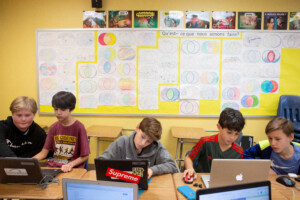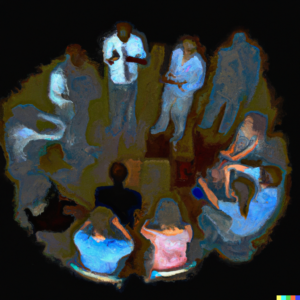Tapscott Refutes Richel: Smartest Gen is Multi-tasking
Dan Tapscott has a must read HuffPost in response to the hyperbolic Richel piece in the NYTimes (kids all distracted and have ADHD etc). Here’s the heart of the response:
The Times piece is so clichéd and one-sided that it’s more than misleading: it’s dangerous. Anecdotes can be deceptive. … And there are some very big issues being discussed in this piece, not just about technology and kids, but its role in the home, schools and society. And I worry that many parents and teachers might draw the wrong conclusion.
To begin, there is no actual evidence to support the view that this generation is distracted, performing poorly or otherwise less capable than previous generations. In fact the evidence suggests that on the whole, this is the smartest generation ever. IQ is up year over year for many years, university entrance exam scores are at an all time high and it has never been tougher to get into the best universities. Furthermore, volunteering amongst high school and university students is at an all time high and in the US the percentage of kids that are clean in high school — i.e. they don’t do drugs or alcohol — is up year over year for 15 years. This is a generation about which we can be enormously hopeful….And when it comes to the poor performance of the bottom tier, blaming the Internet is like blaming the library for illiteracy.
Richel found neurscientists worried about distraction, but Tapscott suggests that
Rather than creating dysfunctional brains that can’t focus, the evidence is just as strong that experience being “bathed in bits” is pushing the human brain beyond conventional capacity limitations. So-called multitasking may in fact result from better switching abilities and better active working memory. Young people are likely developing brains that are more appropriate for our fast paced, complex world.
And to potential for less socializing,
There is no evidence that this is causing a decline in face-to-face communication. Time spent online is not coming at the expense of less time hanging out with friends; it’s less time watching television.
Tapscott agrees that unchecked game play can be unproductive but points out that,
Playing online games can be good for your mind, according to Steven Johnson, writing in Everything Bad Is Good for You: “Games force you to decide, to choose, to prioritize.”. Some of the world’s leading thinkers in this field agree. When James Gee, a teacher and theoretical linguist, started playing video games at age 60, he realized he had to think in a new way. To excel at a video game you have to learn skills that are crucial for any learning experience, such as understanding design principles, making choices, practicing, and discovering.
And that doesn’t even consider the amazing benefit of games like MangaHigh.com (an Revolution portfolio company). Tapscott isn’t worried about multi-tasking either,
When I look at my own children, their friends, and legions of other Net Geners, this is what I see: They’re faster than I am at switching tasks, and better than I am at blocking out background noise. They can work effectively with music playing and news coming in from Facebook. They can keep up their social networks while they concentrate on work; they seem to need this to feel comfortable. I think they’ve learned to live in a world where they’re bombarded with information, so that they can block out the TV or other distractions while they focus on the task at hand.
Tapscott finds the old fashioned prep schools featured in ‘Superman’ aren’t what kids need, instead
what’s needed is an entirely new model of pedagogy and educational modus operandi. To focus on the student, teachers have to step off the stage and start listening and conversing instead of just lecturing. In other words, they have to abandon their broadcast style and adopt an interactive one. Second, they should encourage students to discover for themselves, and learn a process of discovery and critical thinking instead of just memorizing the teacher’s information. Third, they need to encourage students to collaborate among themselves and with others outside the school. Finally, they need to tailor the style of education to their students’ individual learning styles.
Tapscott concludes
the evidence suggests that many young people today are using technology to become smarter and more capable than their parents ever could be; and, like Vishal, to accomplish important, perhaps great things. Rather than kids losing their attention spans there is a stronger case to be made that growing up digital is equipping today’s youth with the mental skills, such as scanning and quick mental switching, that they’ll need to deal with today’s overflow of information. The superior performance for many of them, as evidence by university graduation rates show they know when they have to focus, just as the most intelligent members of my generation did. They may think and process information in a different way than most boomers do, but that doesn’t stop them from coming up with brilliant insights, new models of doing business, new ways of collaborating; or, for that matter, creating a carefully edited film as a teenager.








0 Comments
Leave a Comment
Your email address will not be published. All fields are required.